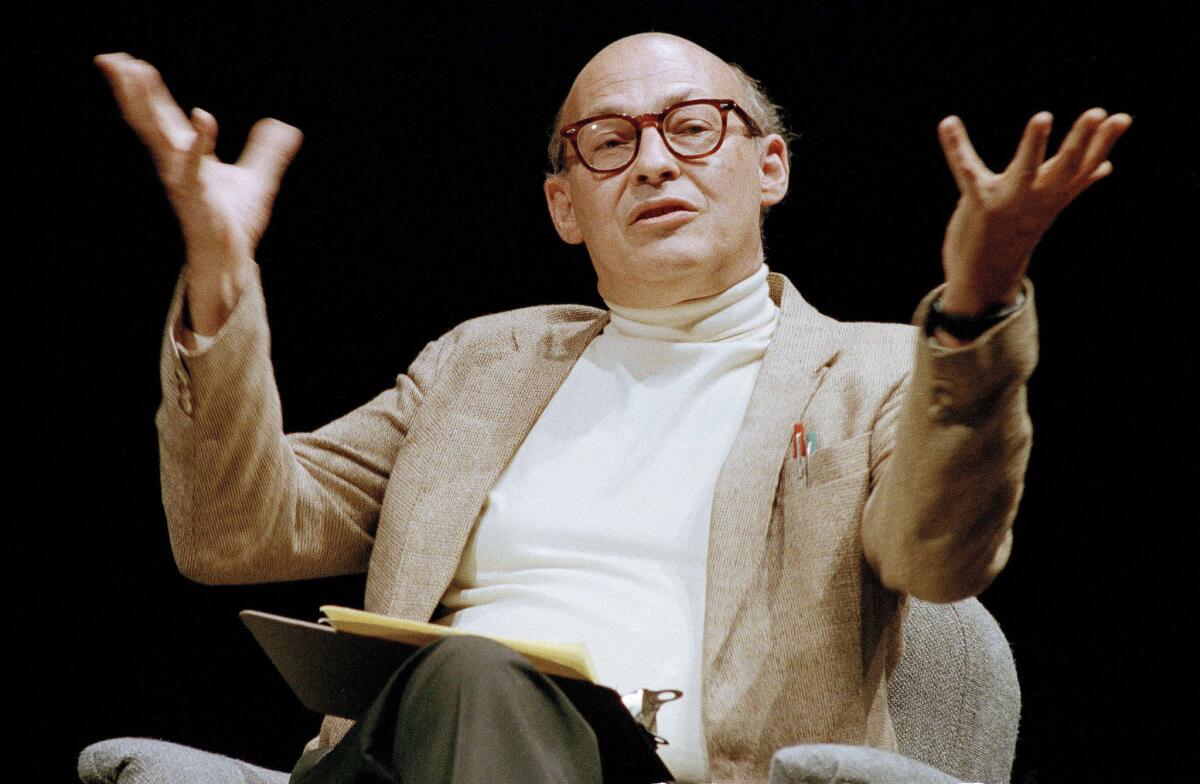Marvin Minsky dies at 88; pioneer in artificial intelligence

Marvin Minsky speaks during a 1987 panel discussion on artificial intelligence in Seattle.
Marvin Minsky, considered a father of the field of artificial intelligence, who sought parallels in the functioning of the human brain and computers, died Sunday in Boston.
The MIT emeritus professor was 88. The cause was cerebral hemorrhage.
Minsky wrote some of the earliest and most influential papers on artificial intelligence and robotics; he viewed the brain as a machine whose functioning can be replicated in a computer and he explored how machines might be endowed with common sense.
He was known for thinking big and for relishing maverick ideas. He seemed to view the work as fun.
He had a “devilish, jovial, delighted grin,” said Tom Mitchell, professor of machine learning at Carnegie Mellon University. “He delighted in messing up what you were thinking about.”
From his earliest days in the field, Minsky had high ambitions for computer intelligence. He thought broadly about the possibilities of machine learning and completed early versions of what are now exploding areas within machine-learning — including language, vision and robotics subfields, Mitchell said. In the 1980s, Minsky published “The Society of Mind,” which is considered a seminal text on intellectual function and structure.
Minsky’s worked encompassed neuroscience, philosophy and music; he was an accomplished pianist. Among his many works is an influential paper dealing with music, psychology and the mind. He also invented a machine that composes and plays music.
“He was really behind a lot of these pioneering efforts to explore the many different forms that lead to our current view of intelligence and that set the stage for much other A.I. research,” Mitchell said.
Minsky once told the New Yorker magazine that he had chosen to study intelligence over other fields because it seemed “hopelessly profound.”
Decades later, he summed up his own work to the Boston Globe: “I make up theories of how the mind works and when I am lucky enough, I have some students who make careers out of that.”
Minsky was born in New York City on Aug. 9, 1927 to Henry, an ophthalmologist, and Fannie Minsky, who was active in Zionist politics. He served in the Navy during World War II, before earning mathematics degrees from Harvard and Princeton.
He married Gloria Rudisch Minsky, a pediatrician, in 1952, and with John McCarthy, he co-founded what is now MIT’s Computer Science and Artificial Intelligence Laboratory in the late 1950s. McCarthy, a Stanford University professor, died in 2011.
Minsky’s work included the development of robotic hands and the earliest confocal scanning microscope. He was awarded the A.M. Turing award, the highest prize in computer science, in 1969.
Minsky is survived by his wife and children Henry, Juliana and Margaret Minsky, MIT said.
More to Read
Start your day right
Sign up for Essential California for the L.A. Times biggest news, features and recommendations in your inbox six days a week.
You may occasionally receive promotional content from the Los Angeles Times.






